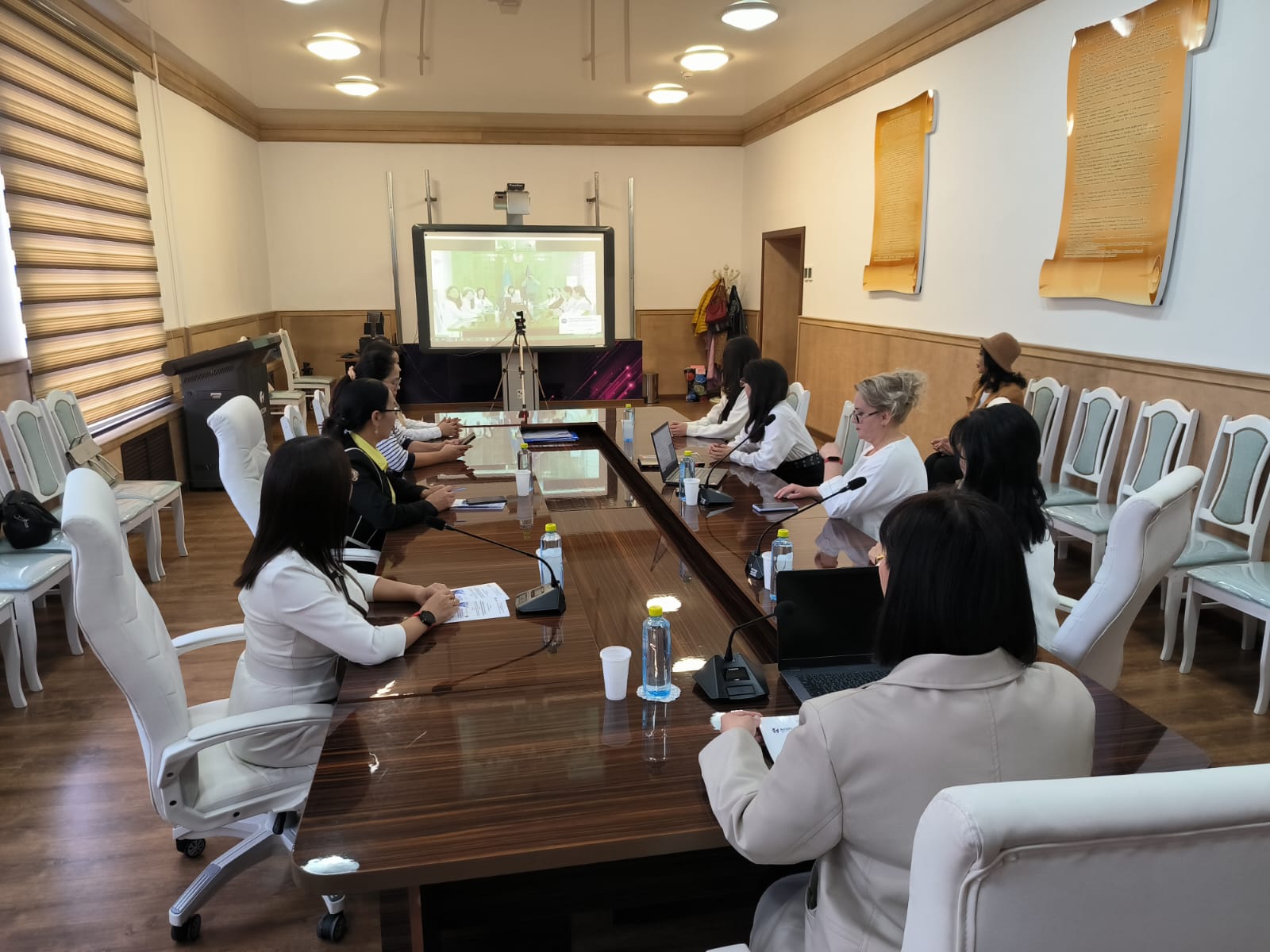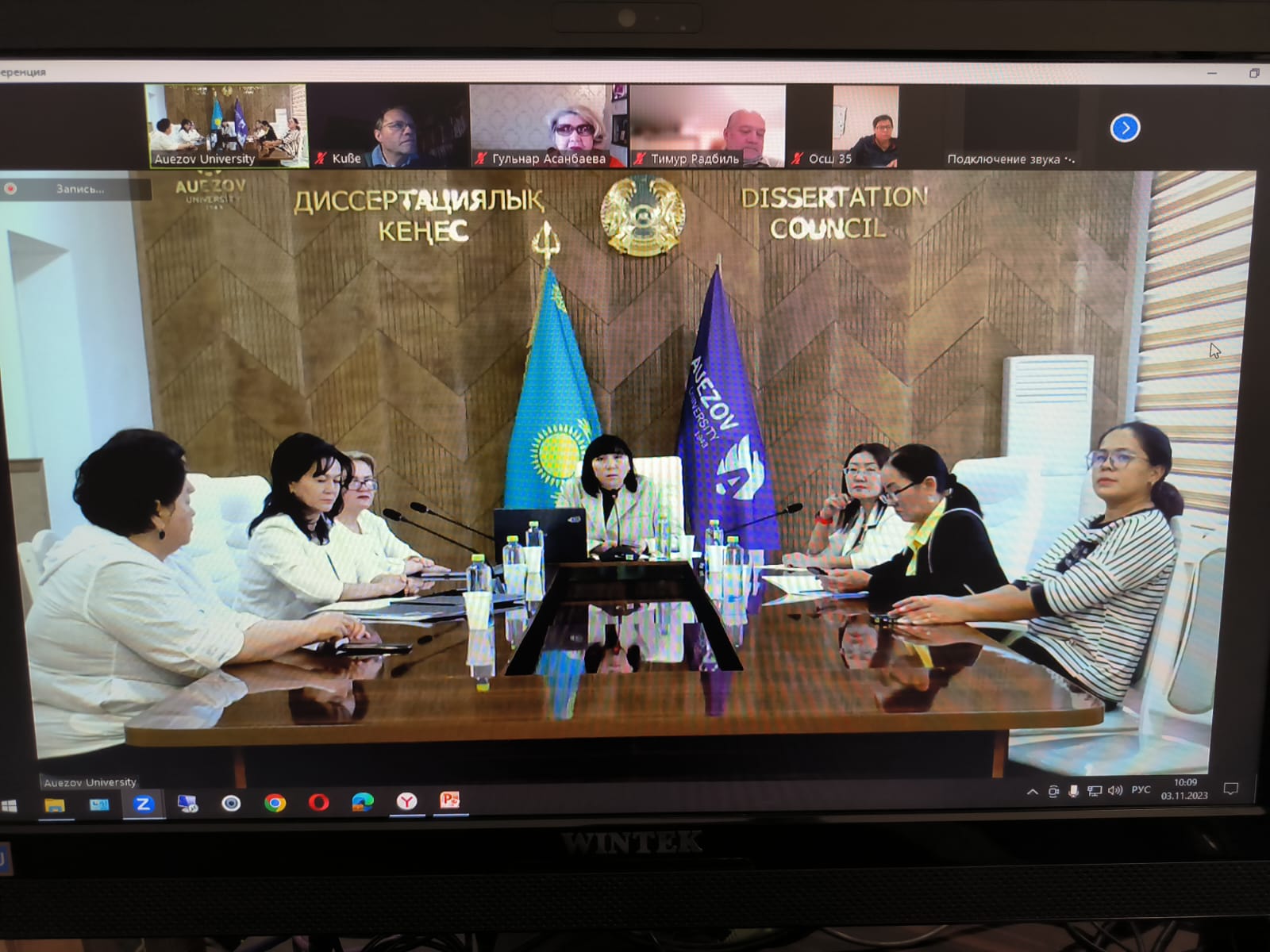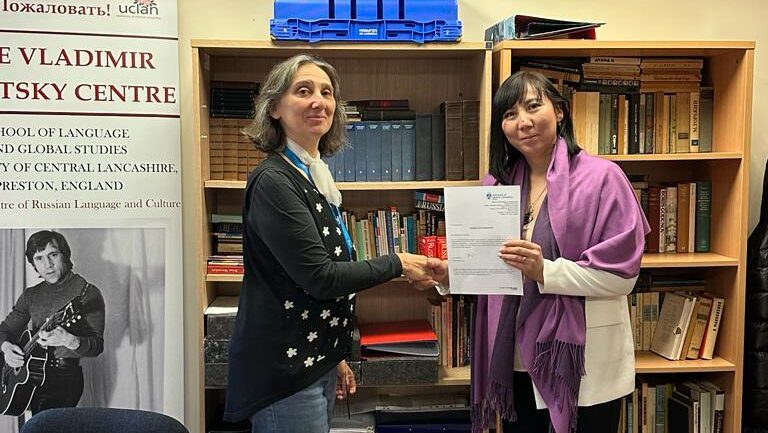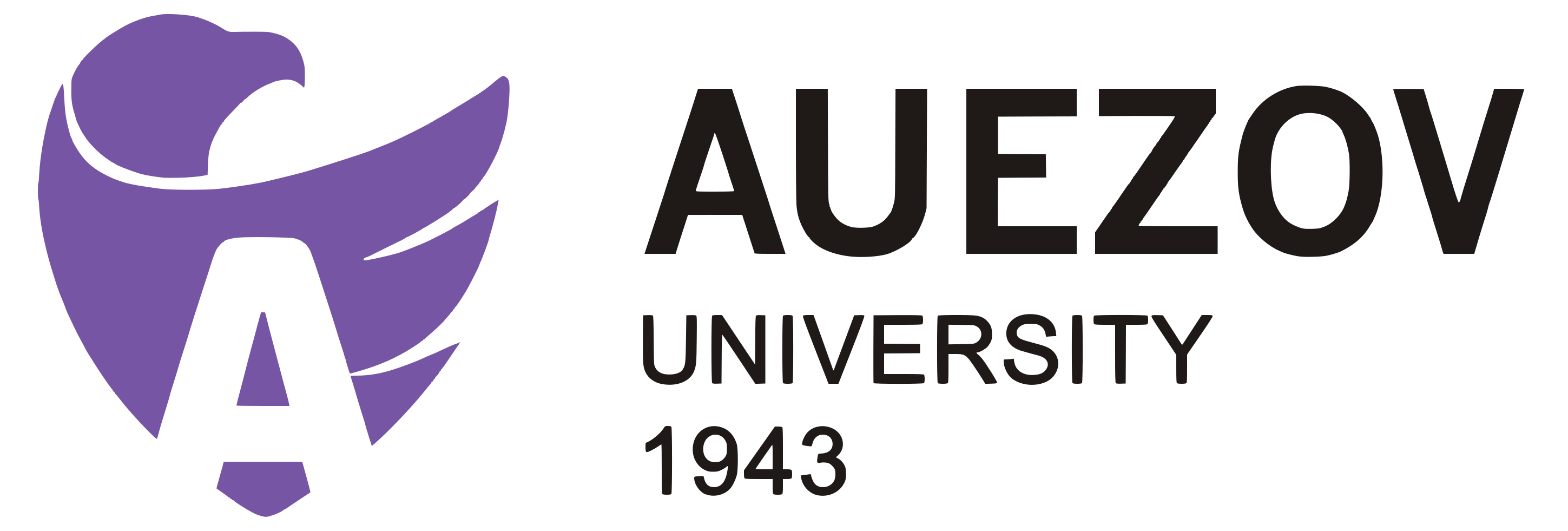About the seminar
RELEVANCE
The relevance of the topic of the scientific seminar is unconditional, since in the modern world and the endless, constantly replenished flow of information, media skills are necessary. The main goal of the round table was to discuss with stakeholders current issues of studying manipulation and promoting media literacy in Kazakhstan and beyond.
OUR SPEAKERS
The seminar was attended by scientists from different cities (Astana, Almaty, Pavlodar, Shymkent) and countries (Germany, China, Russia, Uzbekistan), teaching staff of universities of the country (L. Gumidev ENU, KazNPU named Abay, Toraigyrov University, A. Margulan Pavlodar Pedagogical University, M. Auezov SKU, SKGPU, etc.), managers, psychologists, teachers of schools in Shymkent, as well as representatives of the UNESCO Cluster Office in Almaty, the Y. Altynsarin National Academy of Education, JSC A. Baitursynov “National Center for Research and Evaluation in Education “Taldau”. The seminar discussed issues of media literacy and manipulation mechanisms and ways to overcome them. The issue of manipulation and media literacy in the multicultural Internet space and in the field of education was not left aside.
MEDIA LITERACY AND MANIPULATION
The reports covered global trends and national experience in studying media manipulation and media literacy in an interdisciplinary scientific discourse. Foreign scientists who have been studying the issues of manipulation and media manipulation for many years presented their reports at the conference. The report “What is manipulation?” was presented by scientist Holger Kusse, professor, director of the Institute of Slavic Studies at the Dresden University of Technology (Germany), in which manipulation is revealed as a non-transactional perlocution. Doctor of Philological Sciences, professor, head of the Department of Theoretical and Applied Linguistics N.I. Lobachevsky of the National Research Nizhny Novgorod State University, Radbil Timur Benyuminovich (Russia) shared the problem of linguistic manipulation of consciousness. Irina Sovetovna Karabulatova, Doctor of Philology, Professor of the Institute of Artificial Intelligence M.V. Lomonosov Moscow State University, Professor of the Department of Foreign Languages of the Philological Faculty P. Lumumb RUDN, Head of the Center for Digital Humanities Technologies “Russian Language +” of the Institute of Russian Language of Heilongjiang University, Harbin, China, Russia, shared the problems of manipulating public consciousness in the media space. PhD Hu Jiazhun, a scientist from China, spoke on the topic “Communication tactics for avoiding triggers in modern digital diplomacy”. Kenenbaev Erkin, PhD, Associate Professor of the Chirchik State Pedagogical University, a scientist from neighboring Uzbekistan, spoke on the issues of the influence of the Internet on virtual personality. An expert in journalism education and media literacy, PhD in Philosophy, presented a very informative report on the promotion of media literacy in the higher education system, its challenges and solutions. Gulnar Asanbaeva, who has been researching this issue in Kazakhstan for many years, is one of the authors of textbooks on media literacy for schools and universities in the country. In unison, the report “The role of Internet technologies in promoting conspiracy theories (on the example of Central Asian countries)” was presented by Maral Beisetayevna Aitmagambetova, PhD in Philology, regional expert on MIL, participant in UNESCO IITE projects and the MediaCAMP project of the Internews representative office in Kazakhstan.
MEDIA LITERACY AND SCHOOL
The school education system is also actively researching and implementing media literacy promotion programs in practice. Vice-President of the Y. Altynsarin National Academy of Education, Master of Natural Sciences, author of curricula and textbooks, Ruslan Adilkhanovich Karatabanov spoke about the unpacking and implementation of media and information literacy in the content of education in one specific school subject. The seminar also gave an opportunity to teachers and school principals of the city of Shymkent to speak (Sikhambekova Zhanslu Abdrazakovna, director of secondary school No. 30 named after O. Zhandosov, Zhapbarkulova Saltanat Rakhmanberdievna, teacher of Russian language and literature, deputy director for educational work of secondary school No. 17 named after M. Yu. Lermontov, Pesygina Natalya Yuryevna, psychologist of secondary school No. 35 named after Manshuk Mametova). They shared their observations at school about the influence of the media on the personality of a teenager, methods of manipulation among schoolchildren, the problems of cyberbullying and recommendations for combating it.
MEDIA LITERACY AND THE MEDIA
Representatives of the media also took part in the seminar. A report on the importance of reliable information in social networks was made by Maiusova Nurzhamal Abilzhankyzy, Member of the Union of Journalists of Kazakhstan, Head of the Information Analysis Department of the editorial office of the newspaper “Sozak uni”. The topic of a multi-agent approach to the formation, expert markup and classification of the corpus of news texts was presented by Ospanova Ulzhan, Master, Director of the Department of Applied Research and Development of JSC “National Center for Research and Evaluation in Education “Taldau” A. Baitursynova MES RK. This multi-agent approach is one of the main ones in the implementation of this project.
RESULTS OF THE SEMINAR
The seminar was held in a lively atmosphere, those present actively participated in the discussion, demonstrated great scientific interest in the study of media manipulation and the promotion of media literacy in the modern world. All conference participants were awarded certificates. The seminar resulted in a constructive dialogue and exchange of knowledge between all stakeholders and developed recommendations for promoting media literacy in Kazakhstan.






presentations
MAIN SPEAKERS
The report “What is Manipulation?” was presented by the scholar Holger Kusse, Professor, Director of the Institute of Slavistics at the Technical University of Dresden (Germany), which reveals manipulation as a non-transactional perlocution.
The problem of linguistic manipulation of consciousness was shared by Timur Benyuminovich Radbil (Russia), Doctor of Philology, Professor, Head of the Department of Theoretical and Applied Linguistics of the N.I. Lobachevsky National Research Nizhny Novgorod State University.
The report on the promotion of media literacy in the higher education system, its challenges and solutions was presented by Gulnar Asanbayeva, an expert on journalism education and media literacy, Ph.D. in Philosophy, who has been researching this issue in Kazakhstan for many years and is the author of textbooks on media literacy for schools and universities in the country.
4
MEDIA LITERACY IN SCHOOLS
Vice-President of the National Academy of Education named after Y. Altynsarin. Ruslan Adilkhanovich Karatabanov, Vice-President of the National Academy of Education named after Y. Altynsarin, Master of Science, author of curricula and textbooks, spoke about unpacking and implementation of media and information literacy in the content of education in one specific school subject.
10th International Conference on Education
(London, November 15-17, 2023)
Candidate of Philosophical Sciences, Associate Professor of the Department of Russian Language and Literature Shakenova M.T. and doctoral student Khusainova G.Zh. took part in the 10th International Conference on Education (London, November 15-17, 2023) within the framework of the scientific project AP19679821 “Development of a Methodology for Recognizing Media Manipulation and Promoting Media Literacy in the Information Space of Kazakhstan”. They presented a report “Manipulation as an Object of Transdisciplinary Knowledge” (DOI: 10.31039/plic.2023.8.176).
The conference featured papers on overcoming social pressure, avoiding stress, manipulation in the humanities, the introduction of assistive technologies based on artificial intelligence for people with disabilities in professional rehabilitation, strategies for achieving global competitiveness of transnational companies, the impact of artificial intelligence on employment and jobs, creating value in conflict situations, etc.


During the business trip of Shakenova M.T. and Khusainov G.Zh. worked in the training seminar “Media text and media literacy in the system of higher education” (Preston, Vladimir Vysotsky Centre for Slavic Studies at the School of Psychology and Humanities of the University of Central Lancashire). The seminar allowed to get acquainted with the best practices of promoting media literacy in higher education institutions in an intercultural context and received methodological recommendations for the development of digital content
International Summit "Digital Humanities at the Present Stage: Experience, Problems, Prospects" (China, June 13-17, 2024)
PhD Shakenova M. T., PhD Kaldykozova S. E. and doctoral student Khusainova G. Zh. took part in the 1st Harbin International Summit on Digital Humanities “Digital Humanities at the Present Stage: Experience, Problems, Prospects” (June 13-17, 2024) within the framework of the scientific project AP19679821 “Development of a Methodology for Recognizing Media Manipulation and Promoting Media Literacy in the Information Space of Kazakhstan” (conference program).
The purpose of the conference is to analyze problems in the field of digital humanities research, to create a platform for professional dialogue between scientists and practitioners on the issues of studying and teaching key issues in the application of artificial intelligence technologies in the field of humanities, education, culture, and art in universities and schools. Conference partners: Institute for Advanced Study of Artificial Intelligence and Intelligent Systems of M.V. Lomonosov Moscow State University (Russia, Moscow), Institute for Information Transmission Problems of the A.A. Kharkevich Russian Academy of Sciences (Russia, Moscow), St. Petersburg State University (Russia, St. Petersburg), etc.
The following topical issues were discussed at the summit: digital humanities: new trends and challenges of the era; digital education, neuropedagogy, machine learning; digital history, digital migration studies, and e-government; digital urban studies and issues of digital onomastics; computational linguistics, NLP, and translation studies: a breakthrough in the digital age; a new understanding of cyberpsychology, cognitive sciences and neuroaesthetics; digital media space as a challenge to the humanities and exact sciences; artistic creativity as an object of digital analysis.



